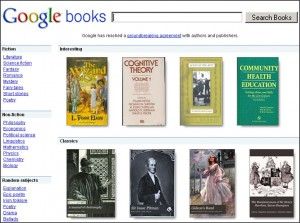Judge Scraps Google Books Deal
Google’s ambition to create the world’s largest digital library and bookstore has run into the reality of a 300-year-old legal concept: copyright.
The company’s plan to digitize every book ever published and make them widely available was derailed on Tuesday when a federal judge in New York rejected a sweeping $125 million legal settlement the company had worked out with groups representing authors and publishers.
The decision throws into legal limbo one of the most ambitious undertakings in Google’s history, and it brings into sharp focus concerns about the company’s growing power over information. While the profit potential of the book project is not clear, the effort is one of the pet projects of Larry Page, the Google co-founder who is set to become its chief executive next month. And the project has wide support inside the company, whose corporate mission is to organize all of the world’s information.
“It was very much consistent with Larry’s idealism that all of the world’s information should be made available freely,” said Ken Auletta, the author of “Googled: The End of the World as We Know It.”
But citing copyright, antitrust and other concerns, JudgeDenny Chin said that the settlement went too far. He said it would have granted Google a “de facto monopoly” and the right to profit from books without the permission of copyright owners.
Judge Chin acknowledged that “the creation of a universal digital library would benefit many,” but said that the proposed agreement was “not fair, adequate and reasonable.” He left open the possibility that a substantially revised agreement could pass legal muster. Judge Chin was recently elevated to the United States Court of Appeals for the Second Circuit, but handled the case as a district court judge.
The decision is also a setback for the Authors Guild and the Association of American Publishers, which sued Google in 2005 over its book-scanning project. After two years of painstaking negotiations, the authors, publishers and Google signed a sweeping settlement that would have brought millions of printed works into the digital age.
The deal turned Google, the authors and the publishers into allies instead of opponents. Together, they mounted a defense of the agreement against an increasingly vocal chorus of opponents that included Google rivals like Amazon and Microsoft, as well as academics, some authors, copyright experts, the Justice Department and foreign governments.
Now the author and publisher groups have to decide whether to resume their copyright case against Google, drop it or try to negotiate a new settlement.
Click here to read more.


